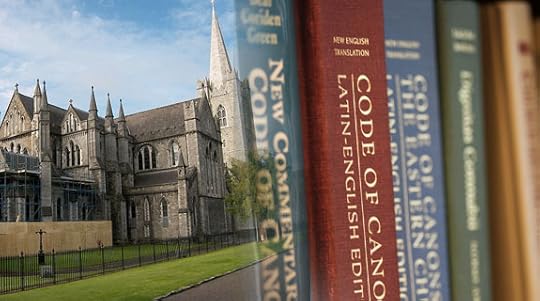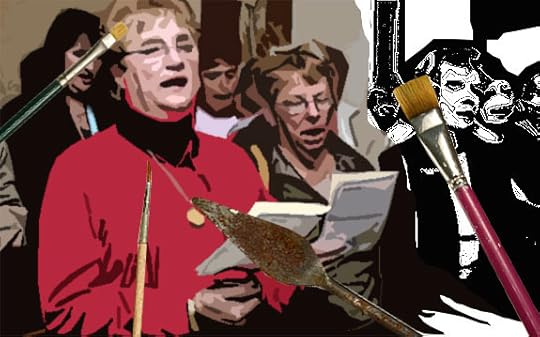Carl E. Olson's Blog, page 209
July 10, 2012
Canon Law Was Not the Problem
Canon Law Was Not the Problem | by Michael Kelly | Catholic World Report
Neglect of canon law, not adherence to it, contributed to the covering up of child abuse by Irish priests.
“Catholic bishops covered up abuse by priests because they relied on canon law rather than the civil law”—it’s a familiar line in the media and from politicians when bishops or religious superiors have been shown to have mishandled abuse allegations. This side of the Atlantic, at least, it’s hard to have a conversation about the issue without this claim being raised—even by faithful Catholics.
It is, of course, true that many bishops did grievously fail children and the Catholic community at large by failing to respond properly to allegations of abuse against priests and religious. However, on closer inspection it becomes obvious that at the heart of the crisis was not only a failure to report a crime to the civil authorities, but also a failure to apply the Church’s own rules, rather than an overreliance on canon law.
Revealing new statistics published by the Archdiocese of Dublin in May offer a decade-by-decade breakdown of when abuse reported to Irish authorities is alleged to have occurred.
The analysis of allegations of abuse made against 98 priests of the archdiocese over a 70-year period shows that the alleged abuse began to skyrocket in the 1960s. Approximately 2 percent of accused priests are alleged to have abused in the 1940s, 4 percent in the 1950s, 23 percent in the 1960s, 27 percent in the 1970s, 34 percent in the 1980s, 9 percent in the 1990s, and 1 percent in the 2000s.
This is very similar to the pattern found in other countries. What explains the fact that the problem became so bad in that particular period—the 1960s to the 80s?
July 9, 2012
The Left, the Right, and Catholicism
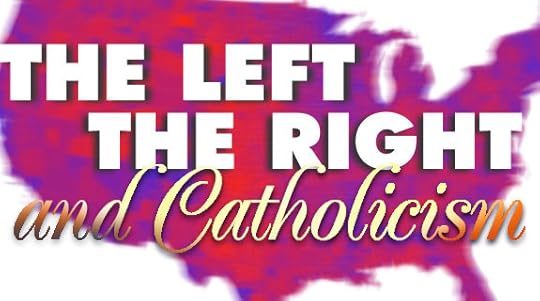
by James Kalb | Catholic World Report
Catholicism sees freedom as directed toward the good life, and fills in the details with its understanding of God and man. Liberalism likes to avoid big issues like God, man, and the good, because they cause arguments, so it sees freedom not as freedom to pursue anything in particular but as freedom to choose freely. Freedom is freedom to go after whatever it is you happen to want.
The result of that view, along with the view that freedom is the highest political goal, is that the good life drops out of sight as a public concern. That’s a problem for Catholics who want to promote the good life through politics, because almost all politics today are liberal. Even the battle between liberals and conservatives is mostly a dispute between two groups of liberals. The two sides may differ in their interpretation of freedom, but they agree that it comes first, and that in essence it’s freedom to do whatever you want.
Progressive liberals take a consumer’s point of view, and combine the belief that freedom is simple freedom of choice with egalitarianism and social management. The result is a sort of Burger King “Have It Your Way” vision of freedom: it’s freedom to choose from a menu that’s as long as possible and available equally to everyone. For that kind of freedom to exist, the choices must be independent of the choices other people make. The menu therefore emphasizes choices that can be made individually and separately, like consumer goods and private lifestyle options. Freedom turns out to mean “access” and “tolerance”—a state of affairs in which people are given what they choose from a set list, and they have a right to have other people go along with their choices.
The Obama campaign’s Julia is a model citizen of a progressive liberal society. Her goals are completely private—even when she has a child it’s an entirely personal choice that has nothing to do with anyone else—and her concern as a voter is to have the government give her what she needs to attain her personal goals reliably and comfortably. The campaign makes her an Internet entrepreneur who creates jobs, and so gives her something of a public role, but the description is unpersuasive. A successful entrepreneur is not likely to be someone whose big political concern is whether other people pay for her birth control pills and provide her with a comfortable retirement.
The main alternative to the progressive liberal ideal today is the conservative or classical liberal ideal. Conservative liberals see freedom from a more typically entrepreneurial perspective. For them, freedom is freedom of action rather than freedom to choose among private satisfactions. They therefore favor a setting in which the rules of property and contract, along with public services like roads, schools, and national defense, allow people to form whatever goals they want and pursue them with whatever means they can put together. Everything’s open-ended, and the sky’s the limit, but it’s up to the individual to figure out where he wants to go and how to get there. The conservative version of Julia would therefore be more like an Ayn Rand heroine. Where Julia wants secure enjoyment of daily satisfactions, an Ayn Rand heroine wants adventure, struggle, and creativity. She is as single-mindedly interested in doing whatever it is she wants to do as Julia, but in a very different style.
July 7, 2012
The true prophet "does not fear to go to such as these also.”
A Scriptural Reflection on the Readings for Sunday, July 8, 2012, the Fourteenth Sunday in Ordinary Time | Carl E. Olson
Readings:
• Ez 2:2-5
• Ps 123:1-2, 2, 3-4
• 2 Cor 12:7-10
• Mk 6:1-6
“It is a mark of great mercy,” wrote St. Jerome, “that God sends him to such as these and that he does not despair of their salvation; and it is a mark of the trust of the prophet that he does not fear to go to such as these also.”
The great doctor was commenting on today’s reading from Ezekiel, but he could have just as well been referring to today’s Gospel reading. Both present a picture so common within both the Old Testament and the Gospels: a prophet of God being met with obstinance, disbelief, and rejection. Ezekiel, along with prophets such as Amos and Jeremiah (who we will hear from in the next two Sundays), took on the daunting work—often reluctantly—of proclaiming the truth to a people hostile to truth and dismissive of God’s law.
The work of the prophet, it’s important to remember, was not primarily about foretelling the future, but about forthtelling the truth, especially the truth about God. Jean Cardinal Danilou, in The Advent of Salvation (Sheed & Ward, 1950), explained that a prophet, in the Bible, was “a man whom the Holy Spirit introduces into the hidden designs of God so that he can be their witness till death.” Prophecy, in this context, was “the understanding and making known of God’s view of history.” And in the unique prophetic work of Christ, prophecy included the revelation of the inner life of the Father and the transforming power of the Holy Spirit.
Ezekiel was told by God to declare to the rebellious people: “Thus says the Lord God!” Prior to the Incarnation, the author of Hebrews wrote, God spoke in “many and various ways,” but “in these last days he has spoken to us by a Son” (Heb. 1:1-2). Rather than mere men speaking the words of God, the Word of God speaks to men as a man. And it is precisely the humanity—the ordinary, everyday humanity—that is a so bewildering and even angering to the people of Jesus’ home town, Nazareth. Wasn’t he just a carpenter, with slivers in his hands and sweat on his brow? Was he not the son of Mary, whose husband had died many years before?
To most of those who had known Jesus his entire life, he was simply too ordinary and normal to be extraordinary and unique. Yes, they were initially astonished when he taught in the synagogue with such startling authority. But they were soon suspicious of his knowledge and wisdom: “Where did this man get all this? What kind of wisdom has been given him?” Of course, those questions are just as central today as they were two thousand years ago. Where, indeed, did this man get his wisdom? Or could it be that he himself is Wisdom, the source of all truth? Yes, Jesus is the wisdom of God, given for our sanctification and salvation (cf., 1 Cor. 1:22-31).
Jesus knew well that to be a prophet was to be a martyr. His great “woes” in the Gospel of Matthew focus on the hypocrisy and bloody deceit of those who gave lip service to the law, but persecuted and often killed the prophets sent by God (Matt. 23:29-37). Thus the sad and knowing words, apparently taken from a well-known proverb, uttered by Christ to his unbelieving neighbors: “A prophet is not without honor except in his native place and among his own kin and in his own house.
Are we any better than the people of Nazareth? Do we, seeing and receiving the Eucharist each Sunday, sometimes take it for granted? Are we tempted to think it is just ordinary bread and simple wine? In looking upon the outward appearance do we fail to see inner reality?
Yes, Jesus had slivers—from carrying the Cross. He had sweat on his brow—from the agony of his Passion. Now, seated in glory, he is sent to us—“such as these”—because he does not despair of our salvation, but grants it freely.
(This "Opening the Word" column originally appeared in the July 5, 2009, issue of Our Sunday Visitor newspaper.)
July 5, 2012
The true story of "For Greater Glory"
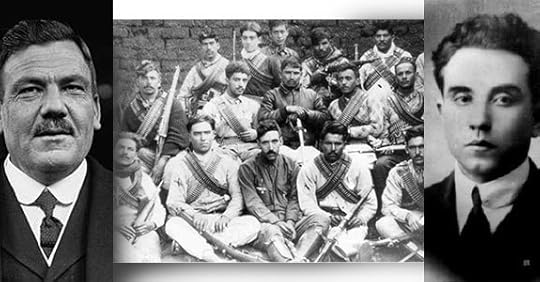
The true story of For Greater Glory | Matthew Cullinan Hoffman | Catholic World Report
Our hemisphere’s greatest martyrs remain virtually unknown to English-speaking Catholics.
The recently-released motion picture For Greater Glory: The True Story of Cristiada is raising awareness of a long-forgotten chapter in Catholic history that seems increasingly relevant for religious believers in America today. Few Americans—and amazingly few Mexicans—have been aware of the epic, three-year struggle to save the Catholic faith that convulsed Mexico in the 1920s, an almost mystical event that has come to be known by the faithful as “La Cristiada.”
Although the movie conveys a rough idea of the Cristiada, a war that took the lives of an estimated 250,000 Mexicans and sent shockwaves throughout the hemisphere, many aspects of the struggle have been omitted or modified. Some of the conflict’s most important figures, such as Anacleto Gonzalez Flores, are glossed over, and others are portrayed in an inaccurate or even inverted manner. In the interest of character and plot development, relationships between characters were created for the film that never existed in reality.
Origins of the Cristiada
The true story of the Cristiada begins in the 1850s, when the US-backed regime of Benito Juarez began the confiscation of the agricultural lands of the Catholic Church, as well as other reforms that culminated in a series of anti-Catholic laws declaring that all of the nation’s churches were property of the federal government, and that no religious expressions of any kind, including the wearing of clerical garb, could occur in public. Today, the government celebrates these changes, which are called La Reforma (“The Reform”), with a paid holiday.
Catholics responded at that time with the revolt of the “Religionists,” a series of violent outbursts and wholesale defiance of the government that would last from 1874 to 1876, and was only pacified by the rise of the dictator Porfirio Diaz, who relaxed the enforcement of anti-clerical policies and laws, although he continued the process of confiscating and redistributing Church lands.
Joseph Pearce announces move to Thomas More College
Prolific author Joseph Pearce recently posted the following announcement on the Ink Desk blog, part of the Saint Austin Review site:
I am delighted to announce that I have accepted a new position with Thomas More College of Liberal Arts in New Hampshire (www.thomasmorecollege.edu). I have been appointed as a Visiting Fellow and as Writer-in-Residence and will commence teaching in the coming Fall semester. I have a long-standing friendship with, and admiration for, William Fahey, the College President, and Christopher Blum, the Dean, both of whom I have known since their days at Christendom College. I am truly delighted and very excited to be part of the same Faculty as these wonderfully learned and devoutly orthodox men. I'm also excited to be part of such a dynamic hub at the centre of the New Evangelization. Thomas More College is not only a Catholic liberal arts school of the first rank and highest order but is also associated with Crisis Magazine and Sophia Institute Press. I feel that I am entering into the very heart of all that is best in contemporary Catholicism and will be joining a band of culture warriors who are defending the Faith robustly against the rising tide of secular fundamentalism. I hope I prove worthy to fight in their ranks.
On a sadder note, my move to Thomas More College ends my eleven year association with Ave Maria University in Florida. I have deep respect for the Faculty at AMU and wish them every success in the future.
Pearce has written several books published by Ignatius Press and is the Senior Editor of the Ignatius Criitcal Editions.
Save 20% on books and films about women Saints

20% off books and films on women Saints!
The feast of Maria Goretti is coming up on July 6. Ignatius Press is offering 20% off on the films Maria Goretti and Fourteen Flowers of Pardon in honor of her feast day. Maria Goretti's devotion to Our Lord and her faith in him is an inspiration to all. We honor her as well as countless women saints who have dedicated their lives to serving God. Choose from any of the books or films listed below to help yourself grow in love and devotion, all at 20% off!
Are you a bay-area native? If so, make sure to register for the up-coming Napa Institute! Not only will you be a part of an enriching conference with great speakers such as Father Joseph Fessio and Peter Kreeft but you will also get the opportunity to see the upcoming epic film Restless Heart on the life of Saint Augustine. To learn more about the film and to watch the trailer, click here. For information about the conference, scroll towards the bottom of this post
Books
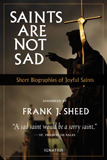 Saints Are Not Sad
Saints Are Not Sad
Short Biographies of Joyful Saints
Frank Sheed
What is a saint? One way to answer is to analyze sanctity, theologically and psychologically. Another way, which is the path Frank Sheed chose in creating this volume, is to show you a saint-or rather, since no two saints are alike-to show you a number of saints.
Regular price: $19.95, sale price: $15.96
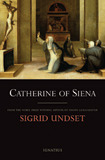 Catherine of Siena
Catherine of Siena
Sigrid Undset
Sigrid Undset's meticulous research of medieval times, which bore such fruit as her masterpiece Kristin Lavransdatter, acquainted her with some of the holy men and women produced by the Age of Faith. Catherine of Siena was a particular favorite of Undset. A moving and memorable portrait of one of the greatest women of all time.
Regular price: $17.95, sale price: $14.36
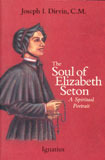 Soul of Saint Elizabeth Seton
Soul of Saint Elizabeth Seton
A Spiritual Portrait
Joseph I. Dirvin, C.M.
Fr. Dirvin, an authority on Saint Elizabeth Seton, takes writings, correspondence, and recollections of Seton to reveal her deep life of faith and prayer. A moving biography and an inspiring record of Elizabeth Seton's interior journey that gives us a profound spiritual portrait of a multifaceted saint.
Regular price: $11.95, sale price: $9.56
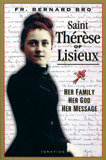 Saint Therese of Lisieux
Saint Therese of Lisieux
Her Family, Her God, Her Message
Fr. Bernard Bro
Fr. Bernard Bro sets forth aspects of her life, personality, and writing that mark Thérèse of Lisieux as one of the truly great exponents of Catholic doctrine. What she offers he claims, is "one of the most certain and simplest evangelical shortcuts ever proposed." Illustrated.
Regular price: $16.95, sale price: $13.56
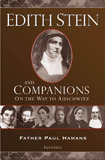 Edith Stein and Companions
Edith Stein and Companions
On the Way to Auschwitz
Fr. P.W.F.M. Hamans
In 1942, St. Teresa Benedicta of the Cross (Edith Stein) and hundreds of other Catholic Jews were arrested by the Nazis: 113 of which died at Auschwitz and elsewhere. Extensive research goes into these biographies. Illustrated.
Regular price: $17.95, sale price: $14.36
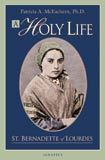 A Holy Life
A Holy Life
The Writings of St. Bernadette
Patricia A. McEachern
For the first time in English, St. Bernadette's own spiritual insights: thoughts, advice, sayings, and prayers through the touching words of her spiritual diary, notes, and letters to friends and family.
Regular price: $14.95, sale price: $11.96
Kateri Tekakwitha
Mohawk Maid
Evelyn Brown
This book is from the famous line of Vision books of saints that are one of the most popular and well-told series of stories for young people. This is the inspiring story of Blessed Kateri Tekakwitha, a holy young Indian woman who was converted to Christianity by the French missionaries led by Saint Isaac Joques during the 1600s.
Regular price: $9.95, sale price: $7.96
Saint Joan
The Girl Soldier
Louis de Wohl
This volume in the Vision Books series of saints for youth combines a world famous Catholic novelist, Louis de Wohl, with one of the most thrilling and dramatic saint's lives in history, St. Joan of Arc.
Regular price: $9.95, sale price: $7.96
Saint Helena and the True Cross
Louis de Wohl
Set against the colorful background of power struggles in imperial Rome and battling Roman legions, this is the exciting story of St. Helena, mother of the Emperor Constantine, who found the Cross of Christ in Jerusalem. This book for young people paints a vivid portrait of a remarkable woman who overcame every obstacle with faith, hope, perseverance... and a healthy dose of ambition.
Regular price: $9.95, sale price: $7.96
Lay Siege to Heaven
A Novel of St. Catherine of Siena
Louis de Wohl
Continuing his popular series of novels about saints of the Church, de Wohl devotes his considerable talents to an interpretation of one of the most unusual women of all time, Saint Catherine of Siena.
Regular price: $17.95, sale price: $14.36
Saint Gianna Molla
Wife, Mother, Doctor
Pietro Molla
This is the inspiring story of Gianna Molla. Diagnosed with uterine tumors during her fourth pregnancy, she refused a hysterectomy that would have aborted the child, and opted for a riskier surgery in an attempt to save the baby. Herself a medical doctor, Molla did give birth to the child, but succumbed to an infection.
Regular price: $11.95, sale price: $9.56
Joan of Arc
Mark Twain
A fascinating and historically accurate account of the story of Joan of Arc told by America's greatest storyteller. Twain spent years of research on the book and considered it his most important work.
Regular price: $16.95, sale price: $13.56
The Living Wood
Louis de Wohl
The renowned novelist De Wohl, with his usual crisp language and descriptive narrative, as well as irony and humor, presents the colorful and tumultuous times of the early Christian era in this story of intrigue, romance and power politics revolving around Helena, the devoted and saintly mother of Constantine, the first Christian emperor. This historical novel tells the story of the quest for the True Cross.
Regular price: $16.95, sale price: $13.56
Edith Stein
A Biography
Waltraud Herbstrith
A powerful and moving story of the remarkable Jewish woman who converted to Catholicism, became a nun, achieved remarkable success in the male-dominated world of German philosophy, and was sent to a Nazi death camp when she refused to deny her Jewish heritage.
Regular price: $14.95, sale price: $11.96
Films
 Maria Goretti
Maria Goretti
The story of Saint Maria Goretti is retold in this beautifully made film. It tells of the plight of the poor laborers of the time, struggling to survive. Luigi and Assunta Goretti keep their faith despite the hardship, and instill in their children a deep love for God. Their daughter Maria especially is devout. But tragedy strikes more than once...
Regular price: $19.95, sale price: $15.96
 Saint Rita
Saint Rita
Famous as the patron saint of hopeless situations, St. Rita of Cascia is immortalized in this epic film. The powerful film tells the story of this brave and loyal woman who married her knight, helped him overcome his dark past and convert to the faith, happily bore him two children, and later endured immense pain as she lost everything in her life. Rita finds new hope through the generosity of a convent of sisters, and she develops a deep union with Christ that greatly inspires all who are near to her.
Regular price: $24.95, sale price: $19.96
 Edith Stein
Edith Stein
The Seventh Chamber
This is a moving, artistic portrayal of the life of Jewish philosopher, Catholic convert and Carmelite martyr, Edith Stein, capturing the interior struggles of this extraordinary woman, as well as the great conflicts from her decision to convert to Catholicism. Deeply influenced by the writings of St. Teresa of Avila, she joined the Carmelites and took the name of Teresa Benedicta of the Cross, and was put to death in Auschwitz in 1942, and canonized by John Paul II in 1998.
Regular price: $24.95, sale price: $19.96
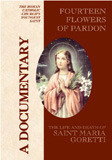 Fourteen Flowers of Pardon
Fourteen Flowers of Pardon
This is the moving story of the life and death of the Church's youngest canonized saint, Maria Goretti. It illustrates Maria's forgiveness of the man who mortally stabbed her because of her resistance of his attempted rape and includes historic photographs, interviews with Maria's mother, and film footage of the canonization ceremony.
Regular price: $24.95, sale price: $19.96
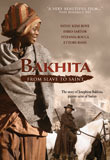 Bakhita
Bakhita
From Slave to Saint
Born in a village in Sudan, kidnapped by slavers, often beaten and abused, and later sold to Federico Marin, a Venetian merchant, Bakhita then came to Italy and became the nanny servant of Federico's daughter, Aurora. She is treated as an outcast by the peasants and the other servants due to her black skin and African background, but Bakhita is kind and generous to others. Bakhita gradually comes closer to God with the help of the kind village priest, and embraces the Catholic faith.
Regular price: $24.95, sale price: $19.96
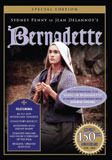 Bernadette
Bernadette
150th Anniversary Edition
From Jean Delannoy, one of France's foremost filmmakers, comes this top quality feature film production of the story of St. Bernadette and the apparitions of Our Lady of Lourdes. Actress Sydney Penny gives a beautiful performance as Bernadette. "Shot on location in France with outstanding cinematography and a beautiful music score, this is the film that was chosen to be shown daily at the shrine in Lourdes.
Regular price: $19.95, sale price: $15.96
St. Teresa of the Andes
A beautiful, epic mini-series produced in Chile that tells the story of the inspiring life of the new young Carmelite saint who lived in the 20th century, died at the age of just 19 years old, and was canonized by Pope John Paul II in 1993.
Regular price: $34.95, sale price: $27.96
St. Teresa of Avila
With meticulous attention to detail and historical accuracy, outstanding production values, and an incredible performance by actress Concha Velasco as Teresa, this acclaimed major film production is the definitive film on the life of this great saint.
Regular price: $39.95, sale price: $31.96
Ignatius Press is collaborating with the Napa Institute on its second-annual conference, July 26-29, 2012, on the theme “Catholics in the next America”. The conference will showcase inspirational, thought-provoking presentations by world-class Catholic thinkers from among the ranks of our bishops, priests, religious, and lay leaders.
A screening of the forthcoming DVD release from Ignatius Press on Saint Augustine will be shown to those in attendance. To see a sneak peak of the film, click here.
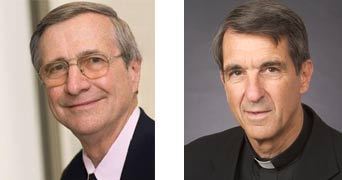
One of this year's featured speakers is Ignatius Press Founder and Editor, Father Joseph Fessio, S.J. Also among the speakers are best-selling Ignatius Press authors Peter Kreeft and Father Robert Spitzer.
Also featured will be Archbishop Charles Chaput of Philadelphia, Bishop Robert Morlino of Madison, Bishop Salvatore Cordileone of Oakland, Bishop Robert Vasa of Santa Rosa, Father Robert Barron, Father Norbert Wood, Frank Hanna, Leonard Leo, Hugh Hewitt, Tim Gray of the Augustine Institute, and Elizabeth Yore.

This year’s Napa Institute will focus on three topics that affect every Catholic committed to living out the faith in an increasingly secular and atheistic society— Religious Freedom, Catholic Education, and Reason & Faith.
For more information, or to register, please visit the Napa Institute website.
Catholic World Report and Homiletic & Pastoral Review
"We didn't pick the time, nor did we pick the fight"
by Carl E. Olson
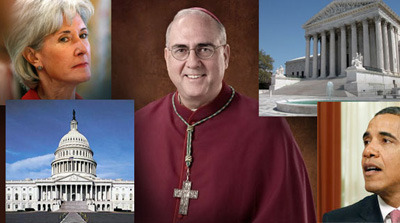
Most Reverend Joseph F. Naumann, D.D., archbishop of the Archdiocese of Kansas City in Kansas, has been an important figure in the U.S. Conference of Catholic Bishops (USCCB) as a member of the Committee on Pro-Life Activities and the Committee on Marriage and Family Life.
He spoke yesterday with Carl E. Olson, editor of Catholic World Report, a few hours after the much-anticipated Supreme Court ruling on the Affordable Care Act, and shared his thoughts about that ruling, the HHS mandate, the national debt, the importance of the principle of subsidiarity, and the role of bishops in articulating and proclaiming Catholic social doctrine.
The Vocation To Life
by Fr. Charles Klamut
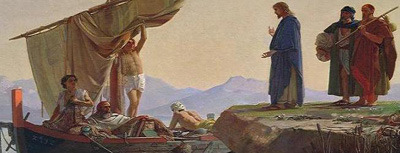
Like the apostles, I first said “yes” to Christ because of the total answer he provided for my human need, and only within this context did a specific vocation to serve as a priest gradually begin to reveal itself.
A few years ago, during a retreat for priests, Msgr. Lorenzo Albacete shared with us a story of his friend, Cardinal Angelo Scola. When asked by a journalist about the shortage of vocations to the priesthood in Italy, Scola replied that the problem stemmed from a deeper crisis: the problem, he said, was that life itself is no longer seen as a vocation.
Albacete reflected on this insight for the next few days, calling it very important, explaining to us what he thought Scola was getting at. The call to life is something given, something prior to our thoughts and schemes. It’s even prior to the particular vocations like marriage and the priesthood.
40% off Vanessa Dekkers' Pick of the Week

40% off Vanessa Dekkers' Pick of the Week
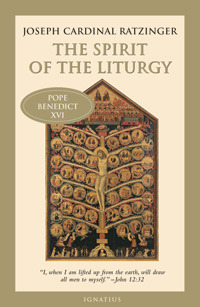 I am recommending the first Ignatius Press book I ever read. The Spirit of the Liturgy by Joseph Cardinal Ratzinger, now our beloved Pope Benedict XVI, has a special place in my life. Because it opened my eyes to the glory of our faith, it led me to other Ignatius Press books and authors and eventually to a job with Ignatius Press. It is an essential book for anyone seeking to understand the true intent of the renewal of the Liturgy and the changes that Pope Benedict XVI has instituted.
I am recommending the first Ignatius Press book I ever read. The Spirit of the Liturgy by Joseph Cardinal Ratzinger, now our beloved Pope Benedict XVI, has a special place in my life. Because it opened my eyes to the glory of our faith, it led me to other Ignatius Press books and authors and eventually to a job with Ignatius Press. It is an essential book for anyone seeking to understand the true intent of the renewal of the Liturgy and the changes that Pope Benedict XVI has instituted.
Returning to the Church after many years away, I realized that my understanding of the Catholic Faith had not kept pace with the rest of my development so I looked for books to expand my knowledge. When I read The Spirit of the Liturgy I knew I had found a truly Catholic author. One who not only wrote in language I could understand but brought me to a deep appreciation of the wonder of our Faith.
Cardinal Ratzinger shows us how central the Liturgy is to it. He explains the scriptural basis of the Mass and each part of it. Liturgy includes not just the priest, the words and the actions but the environment and the music. He shows how each has a place. Spirit of the Liturgy makes me look at every facet of worship as I experience it and say is this the very best that we can offer to God? Is this what Jesus taught us? Does it lead us to the Trinity at the very heart of the Liturgy? How am I answering the challenge that I participate fully? The Spirit of the Liturgy is also available in e-book format.
 Vanessa Dekkers is the Controller for Ignatius Press working here for 3 1/2 years. She discovered the job ordering books on our website. She was considering retiring when she was hired for what she calls her dream job with a Catholic publishing company moving from Arizona where she had lived for 30 years. Vanessa has 3 children and 6 grandchildren scattered across the country.
Vanessa Dekkers is the Controller for Ignatius Press working here for 3 1/2 years. She discovered the job ordering books on our website. She was considering retiring when she was hired for what she calls her dream job with a Catholic publishing company moving from Arizona where she had lived for 30 years. Vanessa has 3 children and 6 grandchildren scattered across the country.
*Employee Pick of the Week program features savings of 40% off a book, movie, or compact disc personally chosen and recommended by an Ignatius Press employee. Each week, an Ignatius Press employee will select a favorite book, movie, or other Ignatius Press product and write a few sentences about why he/she thinks customers will enjoy the particular selection. A short bio of the selecting employee will also be included, giving customers a chance to learn a bit more about the people who are Ignatius Press.
Paint-by-Number Hymns
Paint-by-Number Hymns | Anthony Esolen | Catholic World Report
Why, when we have a trove of profound, beautiful, and poignant hymns, do we have to endure what is banal, clunky, and silly?
“Are you interested in painting, sir?” asks the cheerful curator of the modern art museum.
“No, not me,” says the detective. He passes his hand across his rumpled hair. “Now, Mrs. Columbo, she’s different. That woman is into everything. She does a little painting herself.”
“She does?”
“Oh, yeah, all the time. She buys these kits where you put the color in according to the numbers—you’ve seen them? They actually come out pretty good.”
I like the joke there on modern painting, which to my eye sometimes looks as if the artist could have used a few numbers here or there. But because I have spent all my adult life studying and teaching poetry, from Homer to Robert Frost, I want to cry out to people who try their hands at it, “Please, please, study the masters! Don’t embarrass yourselves! It’s a lot harder than you think.” Indeed, my next book will be on the poetry of Christian hymns; I wish to show ordinary people who attend Mass and who want to lift their hearts in song just how rich the best of those poems are. I want to turn their attention to the artistry, both linguistic and theological. I’d like to be their guide, so to speak, saying, “Look over here—see what he’s done! Isn’t that stupendous?”
We do have a rich treasury of hymn-poems to read, to sing, and to keep close to the heart. Some of them are almost as old as Christianity itself. They come from Latin and Greek, from our own English, from French and German and all the languages of Europe. Some were written by saintly divines with a fine ear for poetry: John Henry Newman (“Praise to the Holiest in the Height”), Charles Wesley (“Love Divine, All Loves Excelling”). Many were written by the great Dr. Isaac Watts, who set the psalms to English meter and rhyme. Some rose up from an anonymous lyricist among the folk: “What Wondrous Love Is This.” Some entered our language by the skill of great translators, like John Mason Neale and Catherine Winkworth. Some were the work of pious laymen who meditated upon Scripture all their lives: so the blind Fanny Crosby gives us “Jesus, Keep Me Near the Cross.” Just as many of our most beautiful melodies were written by the finest composers who ever lived—Bach, Handel, Haydn—so too many of our hymn lyrics were written by poets of some renown: George Herbert, Robert Bridges, Gerard Manley Hopkins, John Milton.
So why, then, why do we have verse-by-numbers lyrics posing as real poems in our hymnals? Why, when we have such a trove of the great, the profound, the beautiful, the memorable, the poignant, the splendid, do we have to endure what is banal, clunky, clumsy, dull, vague, and silly?
July 4, 2012
Ven. Fulton Sheen on democracy, religion, and morality
From a 1943 address by the great Sheen:
There are three points we should like to make in today’s broadcast.
First, it is a sound American principle that democracy cannot function without religion and morality.
Secondly, American democracy is not making provision for religion and morality. Hence, thirdly, the necessity of restoring religious education in order to preserve democracy. First, democracy cannot survive without religion and morality.
The second paragraph of the Declaration of Independence is at the same time a Declaration of Dependence, for it states that our rights have come to us from God, and therefore are "unalienable." If our rights come to us from God, as, rays come from the sun, does it not follow that only on condition that we preserve our dependence on God will we preserve our independence from tyranny? A negative support is given to this thesis by the totalitarian systems, for it is universally true that where religion is most persecuted, there is man most tyrannized.
This intrinsic connection between democracy and religion is part of the American tradition.
As George Washington the founder of our country said: "Of all the dispositions and habits which lead to political prosperity, religion and morality are indispensable supports. In vain would that man claim the tribute of patriotism who should labor to subvert these great pillars of human happiness …"
In the year 1928, Calvin Coolidge stated: "Unless our people are thoroughly instructed in the great truths of religion, they are not fitted to understand our institutions, or to provide them with adequate support."
President Roosevelt said in 1940: "... Practical steps should be taken to make available to children and youth through education the resources of religion as an important factor in the democratic way of life and in the development of personal and social integrity."
We have now come to our second point, namely, democracy is not at the present time making provision in education for religion and morality. About the only group modern education really caters to is the group that neither practices nor believes in any religion.
Read the entire address, "The Christian Order and Education", at www.FultonSheen.com. Also, some pithy Sheen quotes about politics and religion can be found here as well.
G. K. Chesterton on "The Patriotic Idea"
[Note: I posted this excerpt from a 1904 essay by Chesterton a year ago and thought it was worth posting again.] The opening section of G. K. Chesterton's essay, "The Patriotic Idea", first published in 1904, and included in G. K. Chesterton: Collected Works, Volume XX: Christendom in Dublin, Irish Impressions, The New Jerusalem, A Short History of England (also available in softcover), which was edited by Fr. James V. Schall, S.J.:
I
The scepticism of the last two centuries has attacked patriotism as it has attacked all the other theoretic passions of mankind, and in the case of patriotism the attack has been interesting and respectable because it has come from a set of modern writers who are not mere sceptics, but who really have an organic belief in philosophy and politics. Tolstoy, perhaps the greatest of living Europeans, has succeeded in founding a school which, whatever its faults (and they are neither few nor small), has all the characteristics of a great religion. Like a great religion, it is positive, it is public, above all, it is paradoxical. The Tolstoyan enjoys asserting the hardest parts of his belief with that dark and magnificent joy which has been unknown in the world for nearly four hundred years. He enjoys saying, “No man should strike a blow even to defend his country,” in the same way that Tertullian enjoyed saying,“Credo quia impossible.”
This important and growing sect, together with many modern intellectuals of various schools, directly impugn the idea of patriotism as interfering with the larger sentiment of the love of humanity. To them the particular is always the enemy of the general. To them every nation is the rival of mankind. To them, in not a few instances, every man is the rival of mankind. And they bear a dim and not wholly agreeable resemblance to a certain kind of people who go about saying that nobody should go to church, since God is omnipresent, and not to be found in churches.
Suppose that two men, lost upon some gray waste in rain and darkness, were to come upon the light of a porch and take shelter in some strange house, where the household entertained them pleasantly. It might be that some feast or entertainment was going forward; that private theatricals were in preparation, or progressive whist in progress. One of these travellers might lend a hand instinctively and heartily, might play his cards at whist in a fighting spirit, might black his face in theatricals and make the children laugh. And this he would do because he felt kindly towards the whole company. But the other man would say: “I love this company so much that I dislike its being divided into factions by progressive whist; I love so much the human face divine that I do not wish to see it obscured with soot or grease-paint; I will not take a partner for the lancers, for that would involve selecting one woman for special privilege, and I love you all alike.” The first man would undoubtedly amuse the whole company more. And would he not love the whole company more?
Every one of us has, indeed, been lost in a gray waste of eternity, and strayed to the portal of this earth, over which the lamp is the sun. We find inside the company of humanity engaged in certain ancient festivals and forms, certain competitions and distinctions. And, as in the other case, two kinds of love can be offered to that society. The prig will profess to join in their unity; the good comrade will join in their divisions.
If the stray guests see something utterly immoral in the distinctions, something utterly wicked in the ritual, doubtless they must protest; but they should never protest because the distinctions are distinctions, and therefore in one sense exclusive, or because the ritual is ritual, and therefore in one sense irrational. If the stranger in the house has a moral objection, for instance, to playing for money, he ought to decline, though he ought not to enjoy declining. But he must not ask, “Why am I arbitrarily made a partner with So-and-so?” He must not say, “What rational difference is there between spades and diamonds?” If he really loves his kind, he will, as far as he can, and in the great mass of things, play the parts given him. He will preserve this gay and impetuous conservatism; he will throw himself into the competitive sports of nationality; he will walk with relish in the ancient theatricals of religion.
Because the modern intellectuals who disapprove of patriotism do not do this, a strange coldness and unreality hangs about their love for men. If you ask them whether they love humanity, they will say, doubtless sincerely, that they do. But if you ask them, touching any of the classes that go to make up humanity, you will find that they hate them all. They hate kings, they hate priests, they hate soldiers, they hate sailors. They distrust men of science, they denounce the middle classes, they despair of working men, but they adore humanity. Only they always speak of humanity as if it were a curious foreign nation. They are dividing themselves more and more from men to exalt the strange race of mankind. They are ceasing to be human in the effort to be humane.
The truth is, of course, that real universality is to be reached rather by convincing ourselves that we are in the best possible relation with our immediate surroundings. The man who loves his own children is much more universal, is much more fully in the general order, than the man who dandles the infant hippopotamus or puts the young crocodile in a perambulator. For in loving his own children he is doing something which is (if I may use the phrase) far more essentially hippopotamic than dandling hippopotami; he is doing as they do. It is the same with patriotism. A man who loves humanity and ignores patriotism is ignoring humanity. The man who loves his country may not happen to pay extravagant verbal compliments to humanity, but he is paying to it the greatest of compliments - imitation.
The fundamental spiritual advantage of patriotism and such sentiments is this: that by means of it all things are loved adequately, because all things are loved individually. Cosmopolitanism gives us one country, and it is good; nationalism gives us a hundred countries, and every one of them is the best. Cosmopolitanism offers a positive, patriotism a chorus of superlatives. Patriotism begins the praise of the world at the nearest thing, instead of beginning it at the most distant, and thus it insures what is, perhaps, the most essential of all earthly considerations, that nothing upon earth shall go without its due appreciation. Wherever there is a strangely-shaped mountain upon some lonely island, wherever there is a nameless kind of fruit growing in some obscure forest, patriotism insures that this shall not go into darkness without being remembered in a song.
There is, moreover, another broad distinction, which inclines us to side with those who support the abstract idea of patriotism against those who oppose it. There are two methods by which intelligent men may approach the problem of that temperance which is the object of morality in all matters—in wine, in war, in sex, in patriotism; that temperance which desires, if possible, to have wine without drunkenness, war without massacre, love without profligacy, and patriotism without Sir Alfred Harmsworth. One method, advocated by many earnest people from the beginning of history, is what may roughly be called the teetotal method; that is, that it is better, because of their obvious danger, to do without these great and historic passions altogether. The upholders of the other method (of whom I am one) maintain, on the contrary, that the only ultimate and victorious method of getting rid of the danger is thoroughly to understand and experience the passions. We maintain that with every one of the great emotions of life there goes a certain terror, which, when taken with imaginative reality, is the strongest possible opponent of excess; we maintain, that is to say, that the way to be afraid of war is to know something about war; that the way to be afraid of love is to know something about it; that the way to avoid excess in wine is to feel it as a perilous benefit, and that patriotism goes along with these. The other party maintains that the best guarantee of temperance is to wear a blue ribbon; we maintain that the best guarantee is to be born in a wine-growing country. They maintain that the best guarantee of purity is to take a celibate vow; we maintain that the best guarantee of purity is to fall in love. They maintain that the best guarantee of avoiding a reckless pugnacity is to forswear fighting; we maintain that the best guarantee is to have once experienced it. They maintain that we should care for our country too little to resent trifling impertinences; we maintain that we should care too much about our country to do so. It is like the Mohammedan and Christian sentiment of temperance. Mohammedanism makes wine a poison; Christianity makes it a sacrament.
Many humane moderns have a horror of nationality as the mother of wars. So in a sense it is, just as love and religion are. Men will always fight about the things they care for, and in many cases quite rightly. But there is another thing which should not be altogether forgotten, and that is this: that in so far as men increase in intelligence they must see that a quite primary and mystical affection is a foolish thing to put into violent competition with another thing of the same kind. Men may fight about a rational preference, because there victory may prove something. But an irrational preference is far too fine a thing to fight about, because there victory proves nothing.
When men first become conscious of splendid and disturbing emotions, it is their natural instinct, their first and most natural and most reasonable instinct, to kill people. Thus, for instance, the sentiment of romantic love went through the same historical evolution as the sentiment of patriotism. When a medieval knight or troubadour realized that there was an intensity in a pure and monogamous sentiment which was quite beyond anything in merely animal appetites, he immediately took a long spear and rushed round the neighbourhood offering to kill anybody who denied that he had fallen in love with precisely the right person. I do not think that it can be reasonably maintained that romantic love has decayed in the centuries succeeding this; what has happened has been that people have perceived not that love is too insignificant to fight about, but that it is too important to fight about. Men have perceived, that is to say, that in these matters of the affections all combat is ineffective, since no combatant would ever accept its issue. Each of us thinks his own country is the best in the world, just as each of us might think his own mother the best in the world. But when we think this we do not proceed, or in the least desire to proceed, to the bellicose test. We do not set our mothers to fight each other in an ampitheatre, and for the excellent reason that if one mother overcame the other mother, it would not make the least difference to anybody. That is the only serious objection to the institution of the duel. That the duel kills men seems to me a comparatively trifling matter; football and fox-hunting and the London hospitals very frequently do that. The only rational objection to the duel is that it invokes a most painful and sanguinary proceeding in order to settle a question, and does not settle it. It is our belief, therefore, that the right way to avoid the incidental excesses of patriotism is the same as that in the cases of sex or war—it is to know something about it. Just as, according to our view, there will always be in some degree the power of sex and the use of wine, so there will always be the possibility of such a thing as patriotic war. But just as a man who has been in love will find it difficult to write a whole frantic epic about a flirtation, so all that kind of rhetoric about the Union Jack and the Anglo-Saxon blood, which has made amusing the journalism of this country for the last six years, will be merely impossible to the man who has for one moment called up before himself what would be the real sensation of hearing that a foreign army was encamped on Box Hill. The light and loose talk about national victories impresses those who think with me merely as a mark of the lack of serious passion. The average reasonable citizen, of whatever political colour, would admit that such talk shows too much patriotism. We should say that it shows too little.
To the cosmopolitan, therefore, who professes to love humanity and hate local preference, we shall reply: “How can you love humanity and hate anything so human?” If he replies that in his eyes local preference is a positive sin, is only human in the sense that wife-beating is human, we shall reply that in that case he has a code of morality so different from ours that the very use of the word “sin” is almost useless between us. If he says that the thing is not positive sin, but is foolish and narrow, we shall reply that this is a matter of impression, and that to us it is his atmosphere which is narrow to the point of suffocation. And we shall pray for him, hoping that some day he will break out of the little stifling cell of the cosmopolitan world, and find himself in the open fields and infinite sky of England. Lastly, if he says, as he certainly will, that it is unreasonable to draw the limit at one place rather than another, and that he does not know what is a nation and what is not, we shall say: “By this sign you are conquered; your weakness lies precisely in the fact that you do not know a nation when you see it. There are many kinds of love affairs, there are many kinds of song, but all ordinary people know a love affair or a song when they see it. They know that a concubinage is not necessarily a love affair, that a work in rhyme is not necessarily a song. If you do not understand vague words, go and sit among the pedants, and let the work of the world be done by people who do.” It is better occasionally to call some mountains hills, and some hills mountains, than to be in that mental state in which one thinks, because there is no fixed height for a mountain, that there are no mountains in the world.
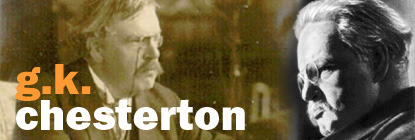
G. K. Chesterton (1874-1936) Author Page | Ignatius Insight
• Articles By and About G. K. Chesterton
• Ignatius Press Books about G. K. Chesterton
• Books by G. K. Chesterton
Carl E. Olson's Blog
- Carl E. Olson's profile
- 20 followers


